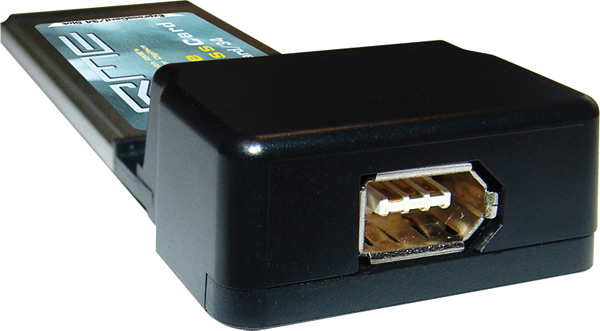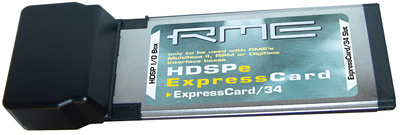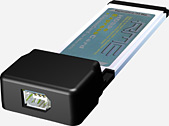PCI Express Series
Internal Interfaces
External Interfaces
more information
RME HDSPe ExpressCard

OUT OF PRODUCTION !!!
Overview
In the year 2001 RME started a revolution in mobile audio recording by introducing the HDSP System, consisting of a CardBus card plus an external I/O-box. The world's first professional multitrack system for laptops was born.
While other products often become obsolete after a few years, continuous firmware and driver updates ensure RME's HDSP system will remain a cutting-edge product with unbeaten performance, as popular and successful as ever. With the HDSPe ExpressCard the HDSP system is still at its best - and compatible with all newer laptops with ExpressCard slots.
The HDSPe ExpressCard uses RME's own audio bus, already known from the PCI version, operating in combination with Multiface II, Multiface, Digiface and the RPM DJ interface. This way RME offers a seamless upgrade path to the faster PCI Express computers. Current RME interface owners will not lose investments made for HDSP breakout boxes when changing from Cardbus to Expresscard interfaces.
HDSPe PCI Card and ExpressCard are simply the best interfaces for professional audio - no other solution can keep up regarding low latency and lowest CPU load. Also in regards of competition RME's HDSP system is still unsurpassed. No other manufacturer offers such a flexible, robust, performing and expandable solution.
The RME ExpressCard works with the Sonnett Echo ExpressCard Adapter on a Thunderbolt port (e. g. Macbook Pro, iMac).
Features

RME's HDSPe Express Card is not based on a PCI to PCI Express bridge, which would simply add PCIe to existing PCI technology. It is a newly developed genuine PCI Express solution, which consequently takes full advantage of the new format, achieving significant performance gains in multitrack audio. Thanks to RME's flash update technology, future firmware improvements, adjustments, and bugfixes can be installed easily at any time. Furthermore, the Secure BIOS Technology ensures that the card stays fully functional even when the flash process fails.
The ExpressCard is based on the PCI Express Base Specification v 1.1. It represents a 1-Lane PCI Express endpoint device and supports 2.5 Gbps line speed. Thanks to the packet-based full duplex communication, the card provides a transfer rate of up to 500 MB/s - 250 MB/s in each direction.
The connection between ExpressCard and I/O box is established using ordinary FireWire cable (IEEE 1394, 6-pin). The data transfer does not use FireWire protocol, but RME's own proprietary bus protocol. The supplied cable is 4 m (12 ft.) long. The ExpressCard does not provide power to the attached I/O-box. Therefore a compact and light-weight hi-tech switch-mode power supply is included.
Tech Specs
ExpressCard, 34 mm standard
1-Lane PCI Express endpoint device (no PCI Express to PCI Bridge), revision 1.1
250 MB/s transfer rate per direction
Secure BIOS Technology: card stays fully functional even when the flash process fails
Output: IEEE 1394 connector, RME bus protocol
Package contents: ExpressCard, cable 4 meter (12 ft) IEEE 1394a, switch-mode power supply 100 V-240 V/12 V - 1.25 A, car cable, battery cable




